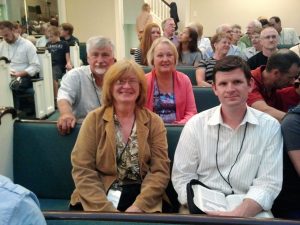Amos 3:1-6
Listen to this message that the Lord has spoken against you, Israelites, against the entire clan that I brought from the land of Egypt (Amos 3:1 CSB)
After his opening announcements of judgment on Israel and her neighbors, Amos begins a section of prophetic proclamations. Notice the phrase listen to this message.
The prophet begins this section with a call to remember their relationship with God (3:1-2). The people addressed were the whole people of God, both Israel and Judah (3:1). God speaks to them as to a “family”. The tone is personal, and it is also redemptive, because God brought them out of Egypt (cf. 2:10).
Although Amos primarily addressed Israel, Judah should also hear (and pay attention to) this message from God. We should look at every sermon as being addressed to us. A quick way to develop a wrong attitude in listening to sermons is to prejudge whether you should listen because “you like it” or “it seems like it might help me” rather than “this is the message God has for me from his word”? Why do you listen? Specifically, the people were instructed to hear what the Lord had against them. It should make a person a very attentive listener when he or she hears that the God of the universe has something against him or her!
Amos described the people (3:2a). They were objects of sovereign love. The words “know”, “choose” and “love” are near synonyms in contexts like this (cf. Genesis 4:1; Exodus 33:12-13,17; John 10:13-15,27-28; Romans 8:29; 1 Peter 1:2). They were chosen by God (Deuteronomy 7:6-8). The doctrine of election is very practical. It is sad that many Christians think of it in a controversial way. God has chosen us; therefore, we should choose him and his ways in response.
Therefore, they stood in a special relationship to God. This is true regarding both the old covenant people (Exodus 19:5-6) and the new covenant people (1 Peter 2:9-10).
The people were responsible (3:2b). The relationship demanded responsibility. Many times in the Old Testament Scriptures Israel is warned of her responsibility to obey the Lord. We also are to obey (Hebrews 8:6-8; 12:4-11). The new and better covenant does not lessen our duty to listen to God and to obey. With the assurance of our high standing in God’s family as adult sons, we should have a heightened sense of our duties. What has been called new covenant theology (I prefer “Christ-structured theology”) does not produce lawlessness, but speaks against it at every point!
Next, Amos called God’s people to right thinking (3:3-6). They needed to know that agreement is essential for fellowship. The kind of agreement referred to here is a “pattern of united living”. Knowing God’s worth and will as his chosen bride, we agree to walk with him in his ways. Four actions were required of them in the covenant relationship with the Lord God:
- Faithful love – “forsaking all others”
- Submission – agreement to follow God’s leadership
- Close companionship – essence of marriage
- Bear his children – fruitfulness
What destroys fellowship? Sin does! Psalm 66:18; 1 John 1:7
In order to enjoy true fellowship in the church, we must agree around the truth. An engaged couple has to reach agreement on basic issues of family life as they move close to finalizing their union, if their marriage is to be successful. “Unless we agree with God in our end, which is his glory, we cannot walk with him by the way” (Henry).
God has reasons for the announced judgment on his people (3:4-5). These reasons were announced in the preceding section. “The threatenings of the word and providence of God are not bugbears [bogeymen] to frighten children and fools, but are certain inferences from the sin of man and certain presages [predictions] of the judgments of God.” [Henry]
The judgments of God were not the products of chance. People are wise in times of trial, if they reconsider their ways and return to the Lord. Perhaps he will be merciful.
God would be the One bringing this judgment (3:6). The theology of the Bible is neither fatalism nor a reign of chance. God is in control of history. Even the smallest events happen according to his controlling will. The evil spoken of is not moral evil, but it is the evil of disaster. Compare Isaiah 45:7.
How is your relationship with God? Are you walking with him? If you are, you are in agreement with him. Are you?Grace and peace,
David

 Psalm 18:1-3
Psalm 18:1-3 Psalm 145:1-3
Psalm 145:1-3

